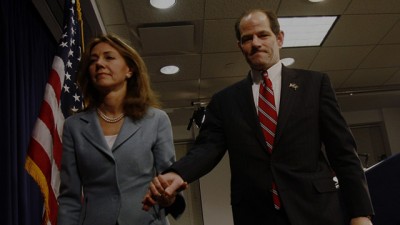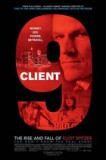| Reviews & Columns |
|
Reviews DVD TV on DVD Blu-ray 4K UHD International DVDs In Theaters Reviews by Studio Video Games Features Collector Series DVDs Easter Egg Database Interviews DVD Talk Radio Feature Articles Columns Anime Talk DVD Savant Horror DVDs The M.O.D. Squad Art House HD Talk Silent DVD
|
DVD Talk Forum |
|
|
| Resources |
|
DVD Price Search Customer Service #'s RCE Info Links |
|
Columns
|
|
|
Client 9: The Rise and Fall of Eliot Spitzer

"This goes back to the days of Greek mythology. This is not a new story." -Eliot Spitzer
But it's always been a good story. Alex Gibney's Client 9: The Rise and Fall of Eliot Spitzer has the makings of great documentary in many of the same ways that Spitzer's story made great copy when it broke back in March of 2008: it's got sex, it's got crime, it's got corruption. What's more, it's got a seemingly virtuous, all but untouchable figure of public service who takes a spectacular nosedive in the full eye of the public, thanks to a lapse in judgment that seems, in retrospect, stunning in its stupidity.
All that was hashed out at the time, in hours of breathless news coverage and commentary; some of it has resurfaced, as Spitzer has re-entered the public eye, co-hosting an evening show on CNN (he is now part of the media machine that ate him alive a mere two years ago). But with every detail of the scandal put under the microscope, what more could a documentarian--even one as skilled as Gibney--extract from a story so thoroughly, breathlessly reported?
Then again, Gibney's unique gift--whether covering the Enron implosion, the torture debate, or the Abramoff scandal--is to push further, go deeper, ask the next question, examine the motivations, find the story underneath the story. That's what he does, to thrilling effect, in Client 9, a movie that looks the Spitzer story right in the eye, and then keeps looking. Why did Spitzer fall? Why did he fall when he did? And--most importantly--who benefited from it?
Gibney's thesis, formulated through profiling Spitzer's rise and closely examining the powerful enemies he made on his way up, is that there were powerful people who wanted to see him disgraced, and who may have played in a role in that fall. Take Ken Langone, the venture capitalist and former head of the New York Stock Exchange; perhaps Spitzer's most outspoken foe, he makes for a complex and entertaining villain. Then there's Maurice "Hank" Greenberg, the former CEO of AIG, who Spitzer (as attorney general) charged with fraud. Or former Goldman Sachs chairman John C. Whitehead, who challenged Spitzer on the pages of The Wall Street Journal--and engaged in a public dust-up afterward. Most intriguingly, there is Roger Stone, the self-proclaimed "GOP hitman" with the Nixon tattoo on his back.
But--and this is key--Gibney's film is complex and mature enough to recognize that sniffing out and questioning the forces at work against Spitzer doesn't excuse what he did, or explain why he did it. "I did what I did," Spitzer says in the film, "and shame on me." The portrait of the political (and economic) climate surrounding Spitzer's downfall is rich, but the most fascinating element of Client 9 is, unsurprisingly, its psychological portrait of its primary subject. To his credit, Spitzer sat with Gibney for several interviews, and those scenes are razor-sharp, frequently funny, and unreasonably fascinating--both in the acutely self-aware commentary of what he says, and the specific way in which he says them. When talking politics, he still talks like a public servant: loud, clear, brash, with self-righteousness and confidence. But as soon as the conversation turns to his "double life," it is, indeed, like he's another person. His voice lowers, his speech rate quickens; he doesn't want to dodge this stuff, because he knows he has an obligation to talk about it, but boy does he want to get it the hell over with. But the candor on display is remarkable, particularly when, towards the end, he looks straight into the camera and talks about his wife. Say what you will about his actions then or his motives now, but you can't fake the emotion he has at that moment.
Alex Gibney has had an insanely busy year; this is his third feature-length documentary of 2010 (following Casino Jack and the United States of Money and My Trip to Al-Qaeda), and he contributed a segment to a fourth, the omnibus Freakonomics. Over the course of those films, his strong, sturdy style has solidified: his films are complicated but not confusing, fast-paced but not showy, entertaining but not shallow. Client 9 plays to his strengths; it compellingly explains the nuts and bolts of a shady operation (here, online prostitution), it uncovers shocking tape (of the illegal $500 million dollar GenRe/AIG deal), and it assembles a cast of entertaining "characters." Aside from Spitzer, Langone, and Stone, there's Cecil Suwall, the giggly, pragmatic 24-year-old madam of the Emperor's Club; crusty (and corrupt) Joe Bruno, Spitzer's greatest nemesis in the state legislature; and the matter-of-fact "Angelina," his most frequent escort--contrary to the post-bust notoriety of the "gov's girl" Ashley Dupre, whom he'd only met the one time. "Angelina," however, would not allow Gibney to photograph her or use her voice, so the director transcribed her interview and hired an actress to "play" her. Some critics and documentary purists have cried foul over this bit of trickery, but hey, at least it's appropriate to the film. If we learned anything from the Spitzer scandal, it's that you can't judge anyone by mere appearances.
Jason lives in New York. He holds an MA in Cultural Reporting and Criticism from NYU.
|
| Popular Reviews |
| Sponsored Links |
|
|
| Sponsored Links |
|
|
| Release List | Reviews | Shop | Newsletter | Forum | DVD Giveaways | Blu-Ray | Advertise |
|
Copyright 2024 DVDTalk.com All Rights Reserved. Legal Info, Privacy Policy, Terms of Use,
Manage Preferences,
Your Privacy Choices | |||||||











